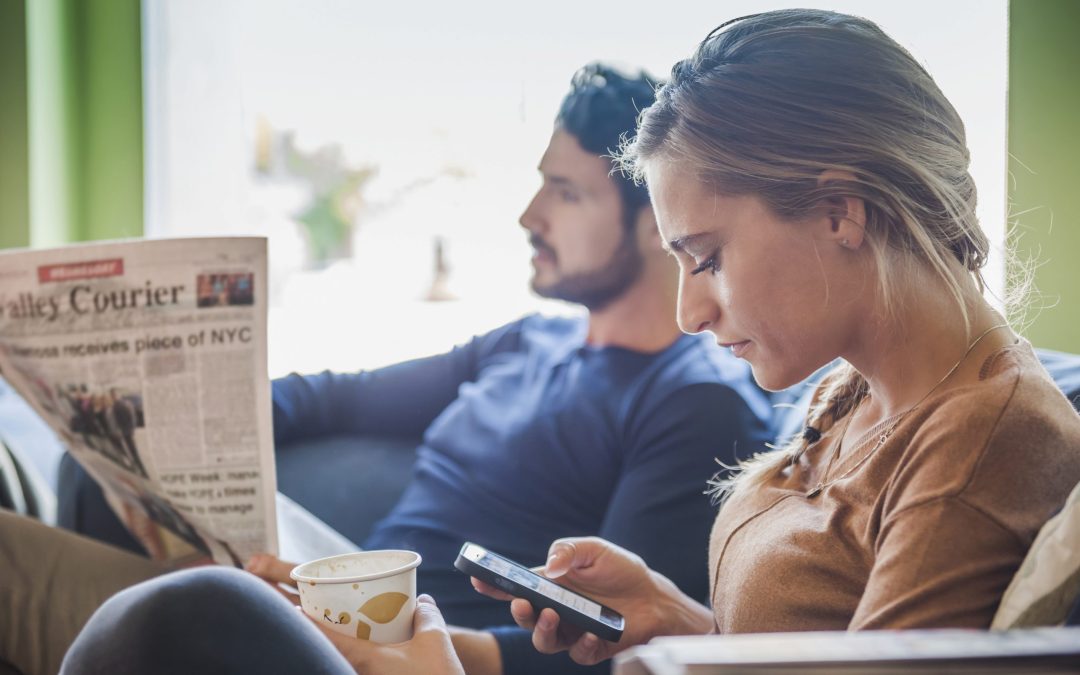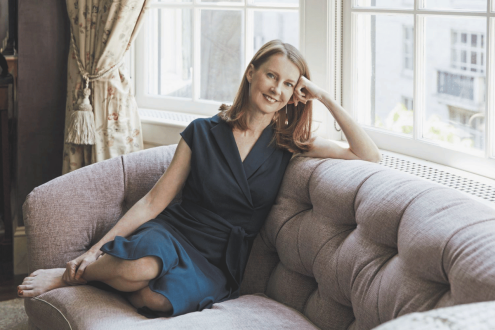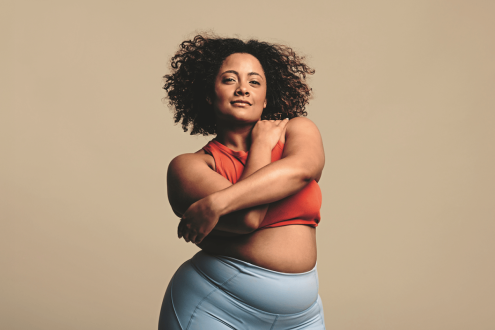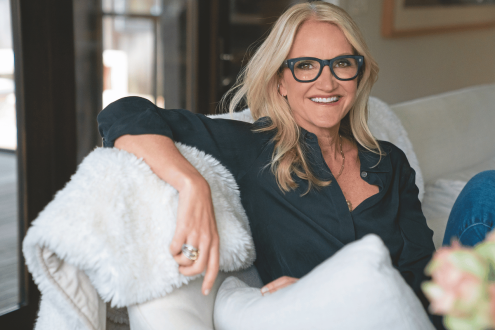Sick of scary headlines?? Take a media diet…
Clem Felix believed it was valuable to know what was going on in the world, but the scary headlines were starting to feel overwhelming. It was time for a media diet

9 minute read
Keeping up with the news is important to me and, without wanting to sound pompous, I feel it is my duty as a citizen in a democracy. But staying informed no longer means simply reading a paper in the morning – news punctuates my day. I do some work, then it’s: hey, BBC News app, what’s happening out there in the big wide world? ‘Cuts to public services’; ‘Five killed in disaster’…
Gosh really? That’s awful, I need to find out more… And then I’m heading down the rabbit hole, looking at other news sites and Twitter. As well as being a drain on my time, I know it’s a drain on my energy. ‘Government crisis’; ‘Terror threat’ – there’s adrenaline in those headlines and a buzz that pulls me in, but I know it drags me down too. Happy stories don’t make strong headlines, which means I am being deluged with bad news, and it can be overwhelming.
Full to bursting
‘I got to the point where I could not bear to read another news story,’ says Jodie Jackson, journalist and author of You Are What You Read: Why Changing Your Media Diet Can Change The World (Unbound, £8.99). ‘They sounded like alarm bells, warning me that something awful was coming.’
Jackson believes that in our 24/7 world, it has become harder to keep a healthy perspective on ‘bad news’ and this is damaging our emotional health. ‘Inflammatory headlines give us a distorted view of life,’ she says. ‘My experience of the world is that it is a remarkable and complex place filled with adventure, imagination and kindness, as well as cruelty, suffering and injustice. I did not and could not believe the gloomy view being portrayed by the media.’
I live in London where, as anyone who reads the news knows, there is major concern about knife crime. After years of terrible headlines, I am aware of it all the time and worry about my children’s safety. The stories are tragic and there is obviously a serious problem that needs to be dealt with and yet, is it rational for this news to so profoundly affect my view of the city? I have not been a victim of knife crime and nor has anyone I know. If I base my outlook on what I experience, I would describe my city as friendly – a bit gritty but nothing like the frightening Wild West the media illustrates. This is an accurate view because, statistically, London is a safe city in which to live.
I realise it is up to me to create balance, where I can be aware of social issues but hold onto the bigger picture. I want to ground myself in the world that I can see, hear and touch and, because I think I’ve got an addictive relationship with news, I am going cold turkey – for a month, I will read no news at all.
The gift of time
Day one is weird. I keep breaking off from my work tasks and looking for a distraction. Not knowing what is going on in the world makes me feel agitated but, by the end of the day, I have achieved rather a lot! As well as completing my work, I have prepared dinner, read an in-depth magazine article and started the groundwork for redesigning my garden – something I have had on my to-do longlist for years. It is a reminder of the time and energy I have been wasting.
On day two, I wake up feeling flat and depressed. I am itching for distraction. I manage to stay away from news, but find myself heading down different anxious rabbit holes. I write a list of ‘healthier’ activities for these moments: running on the spot; planning the next week’s meals; reading a short story.
On day three, I wake up in a fabulous mood. I have more energy and better concentration. At the end of my working day, when my daughter comes in from school, I really listen as she chats about her day. Usually, I am distracted, which I have put down to work, but it seems obvious now that my brain had been full of anxious noise. I feel sad that I have been denying those closest to me my full attention.
I speak to psychotherapist Fe Robinson. Why have I let this happen? She reassures me that in our constantly connected world, my situation is common. ‘It can be panic-inducing to be in silence and many people have a tendency to go from one thing to another. When you’ve got more mental space, your system shows you more. You start to notice your feelings and thoughts, which can be uncomfortable – but the cost of not doing this is that we lose connection with ourselves. It is about balance. Have you got enough downtime to receive messages from your unconscious system? Are you feeling your feelings?’
‘How do I know?’ I ask Robinson.
Poor nourishment
‘For me,’ she says, ‘it is when I have a gnawing sense of anxiety. When I am not feeling my feelings, I can’t settle.’ Also, she says, ‘I find myself reacting to people rather than responding.’
This sounds like the way I have been feeling and I realise that I have chosen one of the worst distractions – by filling myself up with alarming news that I can do nothing about, I am making myself feel anxious and depressed.
‘We don’t get a balance of good and bad news and, from a mental health perspective, that is difficult,’ says Robinson. ‘It is hard not to come to the conclusion that the world is dangerous.’ For me, the result has been overwhelm. But, a week into my media diet, I am feeling better. I am getting used to the new space in my life. I am listening to myself more, allowing myself to feel and work through my emotions.
Robinson gives me advice for reading the news in future. ‘The danger is that if we are not grounded in ourselves, we absorb the distortions of the news as real, rather than just taking in the information. We are meaning-making machines – whatever we take in, we create meaning from and, when you are reading the news, you should bring this fact into your consciousness and be aware of it. Ask yourself: how do I feel about what I have read? What does it mean for me? Then, build a bridge from it to your real experience of life.’
The daily pessimist
A few days later, I go out for dinner with friends and, inevitably, our conversation turns to what is going on in the world and our city. I notice how doomy they are and, unusually, I am the optimist in the group. As they talk about the world’s problems, I find myself saying, ‘I’m sure it will work out.’
They tell me there has been another stabbing. My friend tells me terrible details about it and I find myself rigid with fear, almost traumatised. I still feel upset the following day but, whereas in the past I would have gone online to research more details, as though knowledge would change anything or soothe me, I apply Robinson’s advice and I ask myself: what do I feel about this? The answer is: upset that people can be so evil, plus overwhelmed and frightened.
Voicing this seems to help. I find the strong emotion drifting away and soon I am getting on with my day. But it has shown me that I need to be careful about what I let into my brain. Allowing myself to become paralysed by fear is not going to help anything.
Two weeks in, and I am feeling far less anxious and far more resilient. I see another group of friends, who start talking about the news and, this time, I notice how polarised their views are. They are talking about the same story, but each from their own perspective, and they are not really listening to each other at all. Again, the discussion is bleak.
It reminds me of something Jackson writes – that the anxiety created by the media’s ‘unrelenting focus on the negative’ engenders helplessness and polarises opinion, so people become antagonistic towards each other, rather than working together to solve the problems.
Is that how I used to be? I don’t know – but, looking back, it is clear to me that I was operating in a state of emotional overwhelm, in which I was responding to overstimulation by piling on more of the same. It certainly didn’t help me become a force for good in the world.
Now, when I run into conflict or difficulties, I find myself responding more than reacting – no longer on high alert. When I think about the world’s problems, I am more measured and focused on possible solutions and things that I can do to help.
One balanced news meal
I’m not going to curtail my reading of the news forever but, from now on, I am going to consume it differently. Both Robinson and Jackson recommend taking the long view. ‘Think about getting a weekly summary of the news, or even a monthly one,’ says Robinson. This is, after all, the way people traditionally received news – when a visitor wandered into their settlement. Jackson also suggests seeking out solution-focused news, which has a more balanced perspective.
I am going to stick to one weekend paper for a round-up of events, try solution-focused news sources and take the rest of my impressions from the real world that I inhabit.
Solution-focused news sources: BBC World Hacks; The Correspondent; The Optimist Daily; Positive News; Delayed Gratification – taken from ‘You Are What You Read: Why Changing Your Media Diet Can Change The World’ by Jodie Jackson
The news junkie’s four-week media diet
In a journal, keep track of how you feel during your news-free month. You may be surprised by what comes to light in the absence of constant analysis
- Notice when you feel the urge to reach for newspapers or log onto news websites. What emotion is driving your compulsion – boredom, fear, anxiety or curiosity?
- Become aware of how you might use looking at the news as a displacement activity – what are you trying to avoid doing or feeling by distracting yourself with news? Are you procrastinating? Why?
- Recognise your emotions. Notice how you feel when you sit still and allow yourself to feel your feelings without distracting yourself. What happens to those feelings? Do they linger or can you process them?
- What is a better use of time than scrolling through a newsfeed?
Image: Getty









